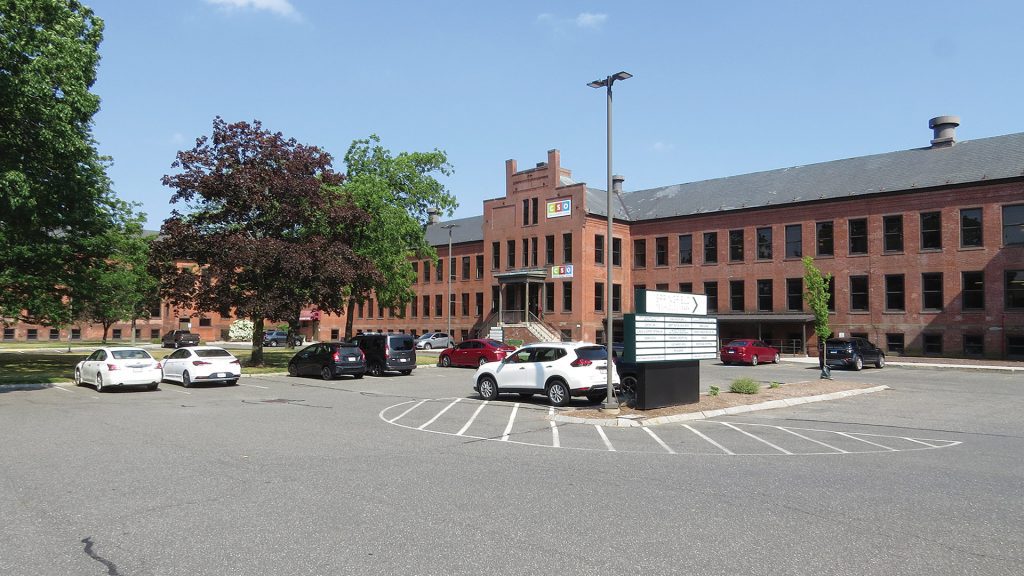Building on a Solid Foundation
Matt Flink was recently named president and CEO of Appleton Corp., the real-estate and property-management arm of the O’Connell Companies. He brings with him considerable experience in this field — and the football field, as a coach. He intends to lean on both as he takes the helm of the company with a solid foundation and opportunities for growth in a number of established niches.
Matt Flink enjoys going to the office every day.
But he especially likes Thursdays. That’s the one day of the week when all employees at the O’Connell Companies are asked to be in the office, with most of them working remotely at least a few of the other four days.
“I love Thursdays — all my friends are there, my colleagues are there — there’s a sense of energy and a liveliness and a vitality that I don’t necessarily get the other days of the week,” he explained, before adding a large-sized ‘but.’
“It’s not about me and what I want, it’s about what’s in the best interest of the company and the best interest our employees,” he went on, adding that remote work is popular, it has become a benefit — and an expectation — at O’Connell, and, as he put it, “the work gets done.”
This same dynamic is playing out in businesses large and small across the region and across the country, and that’s just one of many issues and challenges Flink is facing as he takes the helm at Appleton Corp., the division of Holyoke-based O’Connell Companies that provides property-, facility-, and asset-management services, along with accounting and financial services, to managers and owners of commercial and residential properties across a wide swath of New England.
“We can’t get caught up in old-school thinking that says, ‘it’s always been this way, so it has to continue to be this way.’”
He now presides over a portfolio of managed properties that includes everything from several transportation centers, including Springfield’s Union Station, to the Springfield Technology Park, retail shopping centers, medical offices, and industrial properties. It also includes a number of residential properties, including senior-living facilities.
The broad goal moving forward, said Flink, who was named successor to the now-retired Paul Stelzer last month, is to maintain and grow that portfolio and specific niches within it, such as those transportation centers. There are now several in the portfolio, including 12 in Connecticut, he noted, and the company will aggressively work to build on its track record of success in that realm.
As for the phenomenon of remote work and what it means to office properties here and elsewhere, Flink said property owners and managers, including Appleton, must be imaginative and open to alternative uses for those facilities, because he just doesn’t see things going back to the way they were.
“We can’t get caught up in old-school thinking that says, ‘it’s always been this way, so it has to continue to be this way,’” using that phrase to describe both the office setting and remote work, and how property owners should be looking to fill their spaces.

Flink brings more than 30 years of experience to his new role, a diverse résumé that includes work in Illinois, Colorado, Florida, and 10 years with O’Connell, during which he has served in various roles, including director of Capital Project Management.
He intends to tap that reservoir of experience, which includes work in construction, real-estate development, property management, and sales and leasing, while leading O’Connell to what he expects will be continued growth in an evolving, highly competitive marketplace that is acting and reacting in response to a number of forces, everything from shifting dynamics in the workplace to a still-changing retail landscape to the aging of the population and the need for more senior housing.
He also intends to borrow from his experience coaching youth football, especially when it comes to management and helping team members “understand that they’re probably even better than they think they are,” as he put it (more on that later).
“This opportunity with O’Connell gives me an opportunity to bring all that experience to bear in one location and participate in leading not only what we do Appleton, but in the larger effort that we make with our parent company, the O’Connell Corp.,” he said. “To me, it’s the most logical place for me to land at this point in my career.”
Space Exploration
The Appleton Corp. is approaching its 50th birthday, said Flink, noting that it was launched in 1974 by the O’Connell Companies, a Holyoke fixture for more than 140 years now. The larger corporation also includes Daniel O’Connell’s Sons, a large regional general contractor; Western Builders; the O’Connell Development Group; and New England Fertilizer Co.
Appleton is the property- and facility-management company in what Flink called a “vertically integrated stack.” Appleton manages commercial properties, industrial buildings, warehouses, educational facilities, and multi-family housing properties, including many that are subsidized, especially to senior populations, although some are market-rate.
“We manage properties that we own,” he explained. “But we also manage a lot of properties for third parties that own buildings; we do a lot of management of facilities owned by government entities, such as the technology park and the rail stations.”
It’s a diverse portfolio, as he noted, and it includes everything from an Amazon ‘last-mile’ facility in Holyoke to a biotech research facility on the campus of Worcester Polytechnic Institute. There are some established niches the company has developed, he said, adding that senior housing has long been one of them.
“The things that I learned about coaching my players transfer so wonderfully to our life at the office. I learned that I can’t coach every player, and every employee, the same way; people respond to different types of motivation, different types of stimulation.”
Meanwhile, transportation-facility management has become another niche, he said, adding that there are unique qualities to managing such properties, including the “interface between the public and private,” as he called it.
“Springfield’s Union Station is a perfect example; you have users of the bus facilities here — the PVTA, Peter Pan, Greyhound — and you also have Amtrak and CT Rail bringing people in on the tracks overhead, and all the people using those facilities circulating throughout the concourse,” he explained. “At the same time, you have several businesses that function there, so you have private folks parking in the garage, walking through the concourse, grabbing something at Dunkin’ Donuts, and then going upstairs.

Matt Flink says Appleton has developed a solid niche managing transportation centers, including Springfield’s Union Station.
“Maintaining safe conditions, clean conditions, secure conditions, is an important element in managing those types of facilities,” he went on. “For us, it is a niche market, and one we will continue to pursue.”
Moving forward, and from a strategic perspective, Appleton is focused on two key areas — business development and continuous improvement of the service provided to customers.
Overall, Flink said he has inherited a strong foundation and healthy portfolio from Stelzer, so he doesn’t have to reinvent the wheel, just maintain and build what is in place, with a focus on people and giving them the tools they need to succeed.
“It comes down to keeping our current portfolio stabilized, looking for continuous process improvements along the way, making better use of technology to better serve our customers, and making better use of technology so we ourselves can become more efficient,” he said. “And, at the same time, continuing other lines of our business and, as with those transportation facilities, looking outside of our traditional windows of opportunity. I think we’re well-positioned and well-placed to do that kind of work.”

The Appleton portfolio includes a diverse mix of properties, including the Springfield Technology Park.
As he goes about all this, he will call on not only previous work experience — and there is plenty of that — but also time spent coaching, especially football, at both the youth and high-school levels.
“The things that I learned about coaching my players transfer so wonderfully to our life at the office,” he said, by way of explaining how his work on the sidelines has shaped his management style. “I learned that I can’t coach every player, and every employee, the same way; people respond to different types of motivation, different types of stimulation.
“Some just need me to sit and listen to them and hear them and not even comment much, but just know that I’m hearing them,” he went on. “Some want a really deep and intense dialogue and to take a deep dive into the issues, and want me to act as a sounding board and really spend time devoted to solving problems or envisioning problems and coming up with mitigation strategies. As much as anything, I’ll be a coach trying to help each of our employees find a better version of themselves every day, with the goal of being a little better today than I was yesterday. And tomorrow, I really hope I’m better than I am today.”
Changing Dynamics
Returning to the subject of the office market and what will happen moving forward, Flink said there are many unknowns when it comes to this issue, and it will certainly take some time for the market to fully shake out.
By that, he meant everything from whether office workers will return and when — some are back, but across the country, many are not back or are working in hybrid arrangements — to how properties might be repurposed if they are not used for offices moving forward.
It’s a complex matter, he said, using the O’Connell family of companies as an example of how businesses managed to get work done, and done well, during the pandemic with almost all employees working remotely.
“For 475 days, plus or minus a day or two, we were essentially shut down in our corporate offices with just a few of us there,” he recalled. “What we learned in that period of time is that we can do that very successfully. We can allow people to work at home, we can give them the time they need to attend to things in the middle of the day, but all of us got our work done; we paid bills on time, we responded to requests for proposals on time … we did everything we needed to.
“Our experience in that space is similar to what we’re seeing around the country in that space,” he went on. “The pandemic forced people to rethink how they deliver their work product, what vehicle they use to deliver their work product; at the same time, there began to be a demand, a desire, to stay home once the pandemic eased up and people could return to their office space.”
This concept of remote work has turned into a benefit, he told BusinessWest, much like a 401(k), a vacation, or health insurance. And there is an expectation for it among job seekers and existing employees alike.
These factors have collectively reduced the demand for office space, he went on, adding that there are a few cases within the Appleton portfolio where tenants, specifically large call centers, have contracted substantially.
In one case, space was successfully backfilled, largely with government entities, Flink noted, adding that this may prove to a blueprint for many properties moving forward.
“Repurposing some of those commercial spaces for other user groups is going to be important,” he said. “Going forward, owners and managers of commercial real estate, at least for the short term, and maybe for the long term, depending on how the market responds to this concept of remote work, are going to be clever in how they look at various user groups.”
Imaginative reuse has been the watchword in retail for some time, he went on, noting that, as more shopping is done online, there has been less need for bricks-and-mortar facilities. Larger properties such as indoor malls and strip malls have adjusted by repurposing space for bowling alleys, laser tag, trampoline facilities, and more. Meanwhile, the cannabis industry has had a profound impact on the commercial real-estate landscape, absorbing large amounts of different kinds of spaces, from old mills in Holyoke and Easthampton to storefronts in many communities to a portion of the Springfield Newspapers building.
“Whether it’s that [cannabis] or seeking government entities where you may have looked to place a private tenant before, all this speaks to the need to be clever and really think outside the box and be open to other possibilities in that commercial marketplace,” said Flink, noting that the tech park at STCC is an example of this dynamic. A large call center has moved out, but over the next few years, he expects those spaces to fill back to something close to pre-pandemic levels.
Goal to Go
Getting back to football coaching and how it influences how he manages people, Flink summoned that often-used saying — among coaches and business owners alike — about people needing to give 110%.
“You don’t have to be a math major to know that this is literally impossible — you can’t give more than 100%,” he told BusinessWest. “What it comes down to, whether you’re coaching young athletes or spending time with senior-level executives on our staff, is redefining for people what their true capacity is. Very rarely do we operate at our true capacity; we’re blocked at times by our own negativity or the negative thinking of others. But we’re all capable of being more than we think we are, and helping people to understand where their 100% exists, and how they can live in a world that touches on that more often, is something that I’m passionate about.”
That’s one of many passions, and lessons, from past experiences that Flink will bring to his challenge, one that, as he said, is the logical place for him to be.
George O’Brien can be reached at [email protected]






